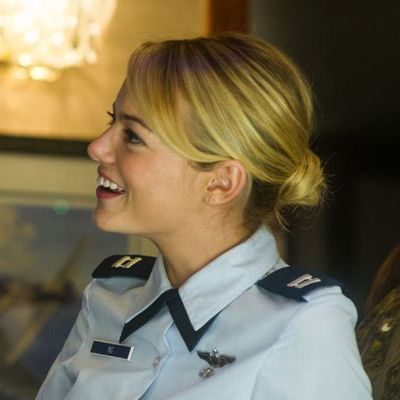
Cameron Crowe’s Aloha is a delightful disaster — the kind of catastrophe that might also remind you why you loved a certain filmmaker in the first place. Crowe’s been in the wilderness for some years. Movies like Jerry Maguire, Almost Famous, and Say Anything are now distant memories; in recent years, he’s made mostly duds. At first glance, Aloha has plenty of elements in common with his earlier classics. It feels like an attempt to bring back the ambitious, personal romantic-comedy form which the writer-director once helped to perfect. But like someone who’s been stranded in a distant land for too long, the film arrives with both too much and too little to say. It comes at us in choppy bursts of brilliance and dopiness. That is at once its great charm and its great curse.
“There was a time when I knew everything in the sky,” Bradley Cooper’s Brian Gilcrest tells us in voice-over early on in the film. “As a kid, I looked up and I felt the future. It belonged to me.” It’s a theme that will get repeated ad nauseam. Brian was once a dreamer, then a soldier and pilot, then a military contractor. He now works for a TED-talking, Bono-befriending tech billionaire (Bill Murray, bringing his usual “who, me?“–ness) who wants to send his own satellite into orbit; the skies, Brian tells us, now belong to the billionaires. When he arrives in Hawaii, Brian’s intent is to get a local tribe to “bless” a gate — a vague-sounding, and vaguely expressed, goal. What it essentially means is that Brian’s boss will be able to build new factories and send more birds up into the skies over the islands.
Escorting Brian on his journey is Allison Ng (Emma Stone), a beautiful Air Force pilot who seesaws between by-the-book formality and complete forthrightness: She addresses him as “Sir,” but also wants eagerly to talk about their common loves — “the sky, the future, everything.” Brian isn’t having it: “Let this be our longest conversation,” he says, cutting her off just as she’s getting started. He’s still pining on some level for Tracy Woodside (Rachel McAdams), to whom he was once almost engaged but who is now married, with two kids, to another pilot, the eerily quiet and often absent Woody (John Krasinski). It’s a not-quite love quadrangle: There are still some sparks between Tracy and Brian, but we know the film will focus more on getting Brian and Allison together, and then driving them apart. Allison, after all, is the one who represents that sense of wonder our hero has since lost.
That’s the structure, anyway — to the extent that there is any discernible structure in Aloha. Brian and Allison actually fall for each other pretty quickly. Other predictable plot points arrive with halfhearted regularity. At times, you can’t help but wonder if someone took Crowe’s footage and tried to turn it into an introductory Save the Cat exercise. You also can’t help but wonder if maybe there’s a wonderful three-hour cut of this somewhere.
What’s onscreen now, alas, feels like a vaguely connected mishmash of stuff. With Woody gone for much of the time, Tracy is hungry for companionship; but she still can’t forgive Brian for abandoning her many years ago. The tech billionaire’s plans for space may be less than entirely noble. There is a random flashback to something that happened to Brian in Kabul. Alec Baldwin shows up as a blustery Air Force general who dances to “Everybody Wants to Rule the World” and tells us that the U.S. military now just services the wealthy: “This is the new military, captain! If Kesha wants to launch a rocket, she probably could.”
But there’s something in that madness, still. Throughout the first half, at least, you may find yourself enraptured by the film’s awkwardness — the way characters speak in logorrheic spurts, as if they don’t quite have a handle on what they’re trying to say. Allison is not the only one trying to balance explosive honesty and clipped reserve; everybody in the movie is holding (or failing to hold) something back.
The movie itself embodies that conflict. As with The Counselor — another recent flop from a great director fallen on hard times — Aloha is a film that, for all its problems, can’t help but be its ragged, wounded, hopelessly romantic self. Quite appropriately, the elemental properties of nature and myth keep intruding. Forests loom dark and deep, the wind blows windows and doors open, and characters struggle against their impulses — impulses both noble and base. There’s also much discussion of iridium flares and night-watching, and Hawaiian gods who have revenge sex in volcanos and turn into teardrops. The dialogue awkwardly, repeatedly spells out basic plot points, but then the film turns around and expresses some of its most important revelations without any words at all; at one point, two characters speak entirely in subtitles.
Crowe’s earlier films — the ones on which he built his reputation — often feel like the work of a man younger than his years, but one who nevertheless fears a dark future. They’re paeans to love and idealism, but they also understand that the world has little time for such things. Haltingly, messily, uncertainly, Aloha stands on the other side of that divide, looking back wistfully on that idealism. It’s a movie struggling with its very essence. Watching that struggle, however, is surprisingly entertaining.


